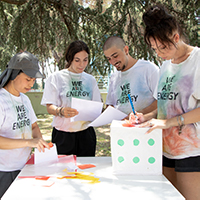Developmental and Educational Psychology
PresentationBack to top
The Master's Degree or Licentiate course in Educational Psychology trains psychologists who are experts in psychopedagogical operations, both within and outside schools. It enables graduates to offer consultancy and guidance to individuals, groups, and institutions involved in educational and school processes; analysis, planning and management of both human and environmental resources, aimed at prevention and finding solutions for individual and group issues.
The Master's Degree or Licentiate course in Developmental and Educational Psychology prepares psychologists to be competent, on a theoretical and methodological level, in psycho-educational interventions in school and psycho-social settings. It provides in-depth knowledge about the different factors that affect development processes and methodological tools for preventive intervention in educational contexts.
It enables guidance and counselling activities for individuals, groups and institutions involved in the educational process; activities of analysis, planning and management of human and environmental resources, aimed at the prevention and resolution of individual and group distress.
Learning outcomesBack to top
At the end of the course of study, graduates must demonstrate:
- to have in-depth and critical knowledge of psychological science, research methodologies and psychological research tools related to the field;
- to have acquired analytical and critical judgment skills regarding psychological, interpersonal, social and environmental factors that characterise psychological development and educational interaction over people's entire lifespan;
- to be able to properly utilise and evaluate psychodiagnostic tools for the integration and support of those working in social/educational settings, for the prevention and treatment of difficulties at school and in services for children, adolescents and families;
- to be able to plan and coordinate intervention programmes aimed at the promotion of the psychological wellbeing of individuals and their holistic development;
- to know how to plan and carry out psychological counselling and guidance in order to prevent emotional, interpersonal and social issues along with promoting cognitive development in social and educational contexts;
- to be able to implement measures to promote parenting skills;
- to be able to communicate with the various stakeholders in a clear and unambiguous manner, in accordance with the ethical principles of the psychologist profession;
- to know and use a foreign language correctly.
Career opportunitiesBack to top
At the end of the course graduates will be able to offer the following activities:
- consultancy and support, both individually and jointly, in social and educational institutions and schools, to teachers, to individuals during their developmental years and to parents, in both the public and private spheres;
- training for teachers, social workers and parents in order to strengthen the resources for developing individuals;
- psychological assessment, both diagnostic and preventive, through the application and interpretation of psychodiagnostic techniques to improve communication and educational processes;
- educational and vocational guidance for students and parents;
- prevention of difficulties encountered in schools and support for teachers and parents;
- supporting processes of development, learning and socialisation both within and outside school.
Those who have obtained a Master's Degree in Developmental and Educational Psychology will be able to register in the Professional Register Section A of Psychologists for the exercise of free professional activity and consultancy in public and private organisations. They may also be admitted to the Schools of Specialisation, Level II Masters and PhD programmes, in accordance with the procedures laid down in the regulations for admission to these courses.
Teaching and learningBack to top
The Master’s Degree Course covers two years, during which 120 ECTS credits must be obtained. To obtain the necessary credits to graduate students must carry out the required training activities (courses, seminars and workshops) and an internship, as stated in the study programme.
Programs of previous years
Degree recognitionBack to top
The academic degrees awarded by the Pontifical Faculty of Educational Sciences «Auxilium» are of pontifical right.
For civil purposes, the qualifications are valid under the Concordats, the laws in force in various States and the specific rules of individual universities and university institutes.
Specifically, the Master's Degree in Developmental and Educational Psychology, according to the Decree of the Ministry of Universities and Scientific and Technological Research of 2 January 1990, is equivalent to those awarded by Italian universities: “for the purposes of admission to the state examination for the practice of the profession of psychologist, the Licentiate and Doctorate degrees issued by the Pontifical Faculty of Educational Sciences «Auxilium» in Rome are considered equivalent to psychology degrees awarded by Italian universities”.
Following the activation of the Bachelor's and Master's Degree Courses, as provided for in the educational regulations of Ministerial Decree 270 of 22 October 2004, in accordance with Presidential Decree 328 of 5 June 2001, Law 163/2021 and the European Diploma in Psychology (EuroPsy) in view of the professionalising internship, the Faculty, in the year 2023, entered into an agreement with the Ordine degli Psicologi del Lazio (Psychological Association of Lazio) regarding internships, which are required for enrolment in the Professional Register of Psychologists Sections A and B.
Admission requirementsBack to top
They can enroll in the Master's Degree (or Licentiate) Course those who have obtained the Bachelor's Degree (or Baccalaureate) in Psychological Sciences and Techniques, or a Degree recognized as equivalent with accreditations properly assessed.
RegistrationBack to top
CoordinationBack to top
JEAN BAPTISTE Marie-Judith
NDERI Lucy Muthoni
NGUYEN Thi Quyen
STEVANI Milena
STRAFFI Elisabetta
VERGARI Maria Grazia
Internal Psychology Internship Commission
NDERI Lucy MuthoniSTEVANI Milena






